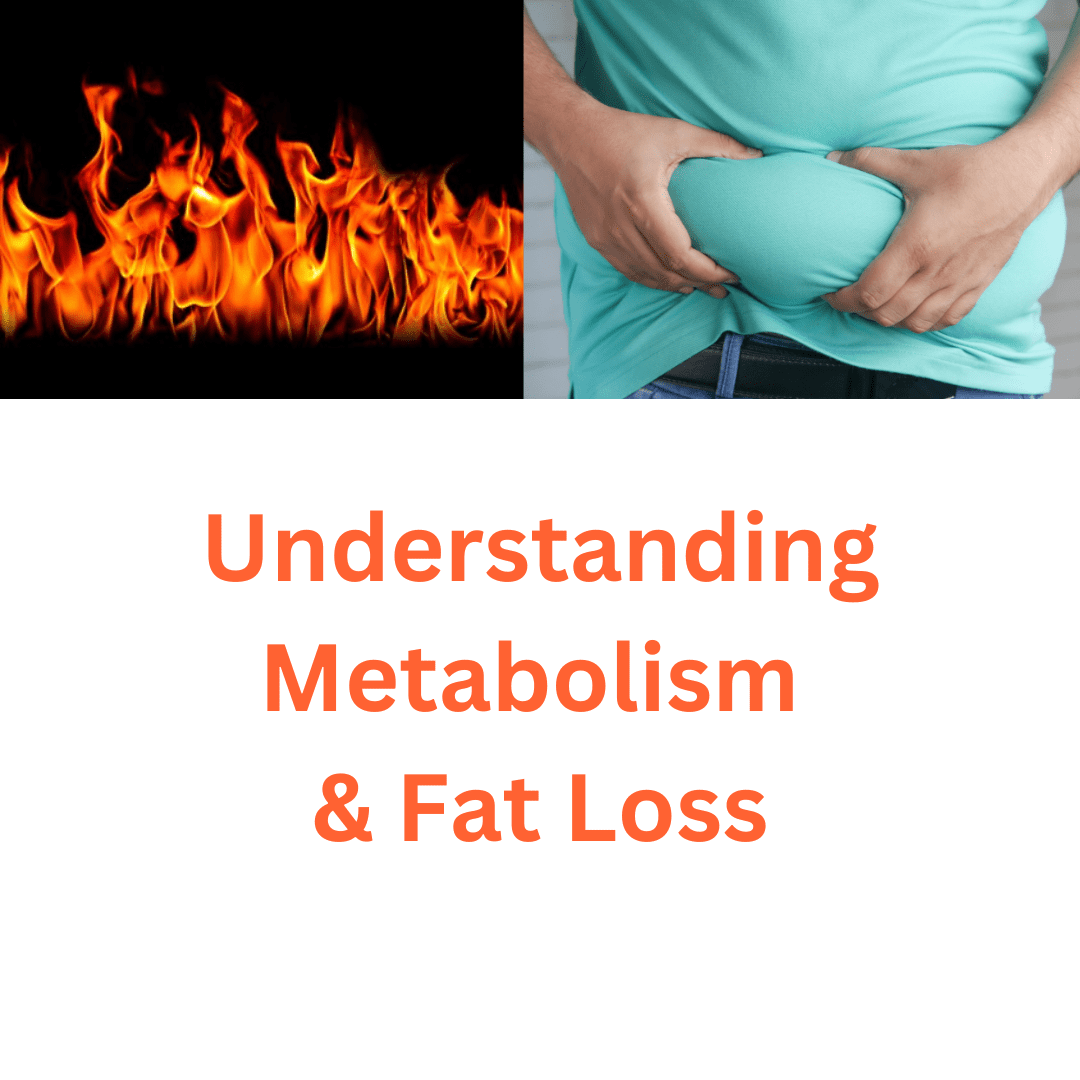
Understanding metabolism for fat loss
Are you ready to dive into the world of understanding metabolism? Buckle up, because we’re about to take a ride on the biochemical highway. But don’t worry, I’ll be your tour guide, and we’ll make sure to have some fun along the way.
Metabolism is a process by which the body converts food and nutrients into energy to keep the body moving and functioning is called metabolism. It’s a natural process that happens in our body 24/7, even when we’re sleeping or resting. The body needs energy to perform various functions, and metabolism helps provide that energy.
Metabolism may sound like a fancy word that only scientists use, but in reality, it’s something that happens in your body every single day. It’s like a never-ending cooking show, except instead of baking a cake, your body is constantly turning food into energy.
In this article, we’ll cover everything you need to know about understanding metabolism, from the basics of how it works to the latest research on how to boost it. So, grab a snack (preferably something healthy), sit back, and get ready to become a metabolism master!
This article is broken down in to the following 5 sections:
- Factors affecting metabolism
- How metabolism changes as we age
- Ways to boost metabolism
- Foods that help metabolism function well
- Role of metabolism plays when losing fat
Factors Affecting Metabolism
Metabolism for fat loss is a complex process. Our cells convert food into the energy required for various functions, including breathing, moving, and thinking.
Age
As we age, our metabolism naturally slows down. This is partly because we tend to lose muscle mass as we get older, and muscle tissue is more metabolically active than fat tissue. However, the extent of this decline varies from person to person and is influenced by factors such as diet, exercise habits, and genetics. More on this in the next section.
Gender
Men typically have a faster metabolism than women, mainly because they tend to have more muscle mass. However, this difference is relatively small and can be overcome by building more muscle through exercise.
Body Size and Composition
Larger bodies generally require more energy to function, so people with a higher body weight or body mass index (BMI) tend to have a higher metabolism. Additionally, as mentioned earlier, muscle tissue is more metabolically active than fat tissue, so people with more muscle mass tend to have a higher metabolism as well.
How the current weight impacts metabolism if you’re overweight right now
Insulin is one of the hormones that regulate metabolism by triggering anabolism after food consumption. Overweight people have a higher risk of developing type 2 diabetes because their body stops responding to insulin. Exercise, healthy eating habits, and bariatric surgery can reverse type 2 diabetes.
What about if you’ve lost weight (or when you will lose weight)?
People who have been overweight, if they go from a restricted diet back to an average one, have a high risk of putting on a lot of weight. This happens because hormonal changes after weight loss slow metabolism and make the person feel hungrier.
Furthermore, if you have lost weight, your body naturally will have lower metabolism because you weigh less. So your daily calorie needs will decrease too.
Genetics
Some people are simply born with a faster metabolism than others, thanks to their genetic makeup. However, this doesn’t mean that genetics are destiny – lifestyle factors such as diet and exercise can still have a significant impact on metabolism.
Basal Metabolic Rate (BMR)
The basal metabolic rate (BMR) is the number of calories your body burns at rest, just to keep your basic bodily functions running. BMR can be influenced by several of the factors listed above, such as age, gender, body size, and muscle mass. However, there are also some things you can do to increase your BMR, such as building more muscle through strength training.
Diet
The food you eat can have a significant impact on your metabolism. Eating a balanced diet that includes protein, fiber, and healthy fats can help boost your metabolism and keep it running smoothly. On the other hand, eating too few calories for an extended period can slow down metabolism as the body tries to conserve energy.
Exercise
Regular physical activity can also help boost metabolism, especially when combined with strength training to build more muscle mass. Even low-intensity activities like walking or yoga can have a positive impact on metabolism.
Hormones
Several hormones play a role in regulating metabolism, including thyroid hormones, insulin, and cortisol. Thyroid hormones, for example, help regulate the rate at which your body burns calories, while insulin helps your body use glucose for energy. Cortisol, on the other hand, can slow down metabolism when levels are chronically elevated due to stress.
Sleep and Stress
Chronic stress and lack of sleep can both negatively impact metabolism, as mentioned earlier. Making sure to get enough restful sleep and finding ways to manage stress can both help keep your metabolism running smoothly.
How metabolism changes as we age
Do you remember how we always hear people saying “Oh, I wish I could eat like I used to and not gain any weight”? Well, it turns out that they’re not wrong. A recent study published in 2021 in the journal Science found that our metabolism changes as we age, and not in the way we thought!
For starters, we always thought that teenagers and young adults were the ones who burned the most calories. But surprise, surprise! Infants actually have the highest metabolic rates of all, pound for pound. That means that a one-year-old burns calories 50% faster than an adult of the same size.
But why do infants have such a high metabolism? We’re not entirely sure yet, but the study’s author, Herman Pontzer, thinks it might have something to do with the fact that babies are growing so rapidly in their first year of life. Their cells are just working overtime!
After infancy, our metabolism slows down by about 3% every year until we hit our 20s. Then, it levels off and stays pretty consistent until we reach middle age. That’s right, no huge uptick in calorie needs during the teen years like we thought. And contrary to popular belief, our metabolism doesn’t really start to decline until after age 60. It’s a gradual process, but by the time someone is in their 90s, they need 26% fewer calories each day than someone in their 20s.
So, why does our metabolism slow down as we age? The researchers say that lost muscle mass might be partly to blame, since muscle burns more calories than fat. But they also found that our cells are just slowing down. It’s not just lifestyle changes or body composition that are causing the decline.

Credit: Herman Pontzer (restyled by Jen Christiansen); Source: “Daily Energy Expenditure through the Human Life Course,” by Herman Pontzer et al., in Science, Vol. 373; August 2021
Ways to boost metabolism
Alright, let’s talk about boosting that metabolism! You know, that magical process that turns food into energy? Yeah, that’s the one. So, how can we get it revving like a race car? Let’s dive in!
Increasing Muscle Mass
Listen up, gym rats! Building muscle mass isn’t just about looking good in a tank top. Muscle tissue burns more calories than fat tissue, even at rest. So, hit those weights and get those muscles pumping!
Eating a Balanced Diet
A healthy diet is key to a speedy metabolism. Make sure you’re getting enough protein, healthy fats, and complex carbs. And don’t forget those fruits and veggies!
Managing Stress and Sleep
Stress and lack of sleep can wreak havoc on your metabolism. So, take a breather and relax! And don’t skimp on those Z’s – your body needs that rest to function properly.
Hormones that Affect Metabolism
Your hormones can play a big role in your metabolism. Things like thyroid hormones and insulin can affect how efficiently your body burns calories. So, talk to your doctor if you think there might be an issue.
Alright, there you have it! Four ways to get that metabolism humming like a well-oiled machine. So, get out there and start pumping some iron, munch on those veggies, and catch some Z’s!
Foods that help metabolism function well
Welcome to the section on foods that help boost your metabolism. So you’ve learned about understanding metabolism and how it affects your body, but did you know that certain foods can actually help your metabolism function even better? Let’s dive in:
- High protein foods: Not only do they keep you full, but they also require more energy to digest than other foods, which means your body burns more calories just processing them. So go ahead and have that steak or chicken breast! Also, while you lose weight, having protein will help spur protein synthesis to encourage the body to retain muscle mass (which has a faster metabolic rate), as noted in studies.
- Beans/legumes: Packed with fiber and protein, beans and legumes can help regulate blood sugar levels and keep you feeling full longer. Beans are also an excellent prebiotic source which helps you maintain good gut bacteria. As a result, the bacteria creates short-chain fatty acids. A study on short-chain fatty acids found your body improves using stored fat as energy.
- Ginger: Not only does it add a zing to your meals, but ginger has been shown to increase your metabolic rate and help you burn more calories. Additionally, ginger herbal tea helps you feel full.
- Cacao: Dark chocolate lovers, rejoice! Cacao, the unprocessed form of chocolate, has been shown to increase metabolism and help you burn fat. Just don’t get the added sugar (or get a really high % cacao like 85% dark chocolate), or else the sugar has the opposite effect with the empty calories.
- Apple cider vinegar: Studies show potential that consuming apple cider vinegar can increase the enzymes in your body that help break down fat–leading to a boost in metabolism.
- MCT oil: This oil, derived from coconut oil, has been shown to increase energy expenditure and help you burn more calories. When they are absorbed, they go to the liver and are directly used for energy. As a result, MCTs are less likely to be stored as fat.
- Water: Not technically a food, but staying hydrated is important for proper metabolism function. Drinking water can also help you feel fuller and reduce your appetite. Additionally, studies have shown that you briefly increase metabolism 24-30% each time you drink a glass of water.
- Seaweed: High in iodine, which is important for thyroid function, seaweed can help boost your metabolism and promote weight loss.
- Spicy foods like chili peppers: Capsaicin, the compound that gives chili peppers their heat, has been shown to increase metabolism and help you burn more calories in people who are not regularly accustomed to eating spicy foods.
- High-Mineral foods (which help your thyroid work well): Foods like seafood, nuts, and leafy greens are rich in minerals like zinc and selenium, which are important for proper thyroid function and can help boost your metabolism (see study).
So there you have it, folks! Incorporating these foods into your diet can help give your metabolism the boost it needs to function at its best.
Role of metabolism plays when losing fat
Now we’re going to talk about the role of fat loss in better understanding metabolism.
Total Daily Energy Expenditure (TDEE)
First up, let’s define TDEE. This is the total number of calories your body burns in a day, including through basic functions like breathing and digestion, as well as through exercise and other physical activity.
Muscle Loss During Weight Loss
One important thing to keep in mind when trying to lose fat is that you don’t want to lose muscle mass along with it. This is because muscle is a metabolically active tissue that burns calories even at rest, so losing muscle can actually slow down your metabolism. That’s why it’s critical to resistance train and eat enough protein when losing excess fat.
Mobilizing and Converting Fat into Energy
When you’re in a caloric deficit (meaning you’re burning more calories than you’re consuming), your body starts mobilizing and converting fat into energy to make up for the deficit. This is why fat loss is such an important part of metabolism.
Nervous System and Fat Loss
Your nervous system also plays a role in fat loss. Specifically, your sympathetic nervous system (the fight or flight response) can help mobilize fat stores, while your parasympathetic nervous system (the rest and digest response) can help your body conserve energy.
Beneficial Behaviors and Physiology for Fat Loss
When it comes to fat loss and understanding metabolism, there are a variety of beneficial behaviors and physiological processes that can help you achieve your goals. Here are a few of the most important factors to consider:
- Exercise: Regular physical activity is crucial for promoting fat loss and boosting metabolism. This is because exercise helps build muscle mass, which is a key factor in determining your overall metabolic rate. In addition, exercise helps to increase insulin sensitivity, which can help your body use glucose more effectively and reduce the likelihood of storing excess fat.
- Adequate Sleep: Getting enough sleep is essential for maintaining a healthy metabolism and promoting fat loss. This is because sleep deprivation can cause hormonal imbalances that can lead to increased hunger and a slower metabolism. Aim for at least 7-8 hours of sleep per night to ensure optimal metabolic function.
- Stress Management: Chronic stress can have a negative impact on metabolism, leading to weight gain and increased risk of obesity-related diseases. To combat this, it’s important to practice stress-reducing behaviors like meditation, yoga, or deep breathing exercises. Additionally, engaging in enjoyable activities like spending time with friends and family or pursuing hobbies can help lower stress levels and improve metabolic function.
- Balanced Diet: Eating a well-balanced diet that includes plenty of protein, fiber, and healthy fats can help keep your metabolism functioning properly. Meal planning can help. In particular, consuming adequate amounts of protein is important for building and maintaining muscle mass, which is a key factor in determining your metabolic rate. Additionally, fiber helps regulate digestion and can promote feelings of fullness, while healthy fats like omega-3s can help reduce inflammation and promote overall health.
- Hydration: Staying adequately hydrated is essential for maintaining a healthy metabolism and promoting fat loss. This is because water is necessary for many of the body’s metabolic processes, including the breakdown of fat for energy. Aim for at least 8 cups of water per day, and consider incorporating other hydrating beverages like herbal tea or coconut water.
By incorporating these beneficial behaviors and physiological processes into your daily routine, you can help boost your metabolism and achieve your fat loss goals. Remember, sustainable and long-term fat loss requires a holistic approach that includes regular physical activity, stress management, adequate sleep, and a well-balanced diet.
You can Help Boost your Metabolism and Help it Function Better Today
Metabolism is a crucial process that occurs in the body every day, converting food into energy. Several factors affect metabolism, including age, gender, body size and composition, genetics, basal metabolic rate, diet, exercise, hormones, and sleep and stress. Knowing your basal metabolic rate is important in determining how many calories you need to consume daily. It’s influenced by age, gender, body size, muscle mass, and genetics. To boost metabolism, building muscle mass through strength training, eating a balanced diet, and getting regular exercise are recommended. By implementing these lifestyle habits, you can take control of your metabolism and achieve a healthier body.
References:
Pontzer, H., Yamada, Y., Sagayama, H., Ainslie, P. N., Andersen, L. F., Anderson, L. J., Arab, L., Baddou, I., Bedu-Addo, K., et al. (2021). Daily energy expenditure through the human life course. Science, 373(6556), 808-812. doi: 10.1126/science.abe5017.
Kim G, Kim JH. Impact of Skeletal Muscle Mass on Metabolic Health. Endocrinol Metab (Seoul). 2020 Mar;35(1):1-6. doi: 10.3803/EnM.2020.35.1.1. PMID: 32207258; PMCID: PMC7090295.
Wycherley TP, Moran LJ, Clifton PM, Noakes M, Brinkworth GD. Effects of energy-restricted high-protein, low-fat compared with standard-protein, low-fat diets: a meta-analysis of randomized controlled trials. Am J Clin Nutr. 2012 Dec;96(6):1281-98. doi: 10.3945/ajcn.112.044321. Epub 2012 Oct 24. PMID: 23097268.
den Besten G, van Eunen K, Groen AK, Venema K, Reijngoud DJ, Bakker BM. The role of short-chain fatty acids in the interplay between diet, gut microbiota, and host energy metabolism. J Lipid Res. 2013 Sep;54(9):2325-40. doi: 10.1194/jlr.R036012. Epub 2013 Jul 2. PMID: 23821742; PMCID: PMC3735932.
Mansour MS, Ni YM, Roberts AL, Kelleman M, Roychoudhury A, St-Onge MP. Ginger consumption enhances the thermic effect of food and promotes feelings of satiety without affecting metabolic and hormonal parameters in overweight men: a pilot study. Metabolism. 2012 Oct;61(10):1347-52. doi: 10.1016/j.metabol.2012.03.016. Epub 2012 Apr 24. PMID: 22538118; PMCID: PMC3408800.
Vij VA, Joshi AS. Effect of ‘water induced thermogenesis’ on body weight, body mass index and body composition of overweight subjects. J Clin Diagn Res. 2013 Sep;7(9):1894-6. doi: 10.7860/JCDR/2013/5862.3344. Epub 2013 Sep 10. PMID: 24179891; PMCID: PMC3809630.
Mullur R, Liu YY, Brent GA. Thyroid hormone regulation of metabolism. Physiol Rev. 2014 Apr;94(2):355-82. doi: 10.1152/physrev.00030.2013. PMID: 24692351; PMCID: PMC4044302.









